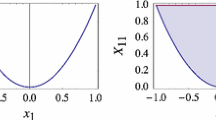Abstract
The paper is dedicated to the study of strong duality for a problem of linear copositive programming. Based on the recently introduced concept of the set of normalized immobile indices, an extended dual problem is deduced. The dual problem satisfies the strong duality relations and does not require any additional regularity assumptions such as constraint qualifications. The main difference with the previously obtained results consists in the fact that now the extended dual problem uses neither the immobile indices themselves nor the explicit information about the convex hull of these indices. The strong duality formulations presented in the paper for linear copositive problems have similar structure and properties as that proposed in the works by M. Ramana, L. Tuncel, and H. Wolkowicz, for semidefinite programming.
Similar content being viewed by others
References
Anh Truong, V., Tunçel, L.: Geometry of homogeneous convex cones, duality map**, and optimal self-concordant barriers. Math. Program. Ser. A 100, 295–316 (2004)
Ahmed, F., Dür, M., Still, G.: Copositive Programming via semi-infinite optimization. J. Optim. Theory Appl. 159, 322–340 (2013)
Berman, A., Shaked-Monderer, N.: Completely Positive Matrices, p. 216. World Scientific, New Jersey, London, Singapore, Hong Kong (2003)
Bomze, I.M., Dür, M., de Klerk, E., Roos, C., Quist, A.J., Terlaky, T.: On Copositive Programming and standard quadratic optimization problems. J. Global Optim. 18, 301–320 (2000)
Bomze, I.M.: Copositive optimization - recent developments and applications. EJOR 216(3), 509–520 (2012)
Bonnans, J.F., Shapiro, A.: Perturbation Analysis of Optimization Problems, p. 601. Springer-Verlag, New-York (NY) (2000)
Chua, C.B., Tunçel, L.: Invariance and efficiency of convex representations. Math. Program. 111, 113–140 (2008)
Dickinson, P.J.C., Hildebrand, R.: Considering copositivity locally. J. Math. Anal. Appl. 437(2), 1184–1195 (2016)
Dür, M.: Copositive Programming - a Survey. In: Diehl, M., Glineur, F., Jarlebring, E., Michielis, W. (eds.) Recent Advances in Optimization and its Applications in Engineering, p. 535. Springer-Verlag, Berlin, Heidelberg (2010)
Gowda, M.S., Sznajder, R.: On the non-homogeneity of completely positive cones, Technical Report trGOW11-04, Department of Mathematics and Statistics University of Maryland Baltimore County Baltimore, MD 21250 USA November (2011) Available at https://www.optimization-online.org/DB HTML/2012/05/3464.html
Jeyakumar, V., Lee, G.M., Dihn, N.: New sequential Lagrange multiplier conditions characterizing optimality without constraint qualification for convex programs. SIAM J. Optim. 14(2), 534–547 (2003)
Kortanek, K.O., Zhang, Q.: Perfect duality in semi-infinite and semidefinite programming. Math. Program. Ser. A 91, 127–144 (2001)
Kostyukova, O.I., Tchemisova, T.V.: Optimality conditions for convex Semi-Infinite Programming problems with finitely representable compact index sets. J. Optim. Theory Appl. 175(1), 76–103 (2017)
Kostyukova, O.I., Tchemisova, T.V., Dudina, O.S.: Immobile indices and CQ-free optimality criteria for Linear Copositive Programming problems. Set-Valued Var. Anal. 28, 89–107 (2020)
Kostyukova, O.I., Tchemisova, T.V.: On a constructive approach to optimality conditions for convex SIP problems with polyhedral index sets. Optimization 63(1), 67–91 (2014)
Kostyukova, O.I., Tchemisova, T.V.: Optimality criteria without constraint qualification for Linear Semidefinite Problems. Special Issue ”Algebraic techniques in Graph Theory and Optimization”. J. Math. Sci. 182(2), 126–143 (2012)
Kostyukova, O.I., Tchemisova, T.V.: Optimality conditions for Linear Copositive Programming problems with isolated immobile indices. Optimization 69(1), 145–164 (2020)
Levin, V.L.: Application of E.Helly’s theorem to convex programming, problems of best approximation and related questions. Math. USSR Sbornik 8(2), 235–247 (1969)
Li, S.J., Yang, X.Q., Teo, K.L.: Duality for semi-definite and semi-infinite programming. Optimization 52, 507–528 (2003)
Luo, Z.-Q., Sturm, F.J., Zhang, S.: Duality results for conic convex programming. Econometric institute report no. 9719/a, Erasmus University Rotterdam, Erasmus School of Economics (ESE), Econometric Institute (1997)
Magnus, J.R., Neudecker, H.: Matrix differential calculus with applications in statistics and econometrics, 3rd edn. John Wiley & sons, New Jersey (2007)
Motzkin, T.: Copositive quadratic forms. National Bureau of Standards Report 1818, pp. 11–12 (1952)
Pataki, G.: A simple derivation of a facial reduction algorithm and extended dual systems. Preprint available https://www.unc.edu/pataki/papers/fr.pdf (2000)
Pólik, I., Terlaky, T.: Exact duality for optimization over symmetric cones, AdvOL-Report No. 2007/10 McMaster University, Advanced Optimization Lab., Hamilton, Canada (2007)
Ramana, M.V.: An exact duality theory for Semidefinite Programming and its complexity implications. DIMACS Technical report 95-02R, RUTCOR, Rutgers University, New Brunswick (NJ) (1995)
Ramana, M.V., Tuncel, L., Wolkowicz, H.: Strong duality for Semidefinite Programming. SIAM J. Optim. 7(3), 641–662 (1997)
Shapiro, A.: Duality, optimality conditions and perturbation analysis. In: Saigal, R., Vandenberghe, L., Wolkowicz, H. (eds.) Semidefinite Programming and Applications Handbook, pp. 67–92. Kluwer Academic Publishers, Boston (2000)
Tunçel, L., Wolkowicz, H.: Strong duality and minimal representations for cone optimization. Comput. Optim. Appl. 53, 619–648 (2013)
Acknowledgements
This work was partially supported by the state research program “Convergence -2025”(Republic Belarus) and by Portuguese funds through CIDMA - Center for Research and Development in Mathematics and Applications, and FCT - Portuguese Foundation for Science and Technology, within the project UIDB/04106/2020. The authors thank the anonymous referees for their very helpful comments and suggestions which aided us in considerably improving the presentation of this paper.
Author information
Authors and Affiliations
Corresponding author
Additional information
Publisher's Note
Springer Nature remains neutral with regard to jurisdictional claims in published maps and institutional affiliations.
Rights and permissions
About this article
Cite this article
Kostyukova, O.I., Tchemisova, T.V. On strong duality in linear copositive programming. J Glob Optim 83, 457–480 (2022). https://doi.org/10.1007/s10898-021-00995-3
Received:
Accepted:
Published:
Issue Date:
DOI: https://doi.org/10.1007/s10898-021-00995-3
Keywords
- Linear Copositive Programming
- Strong duality
- Normalized immobile index set
- Extended dual problem
- Constraint Qualification
- Semi-infinite Programming (SIP)
- Semidefinite programming (SDP)



